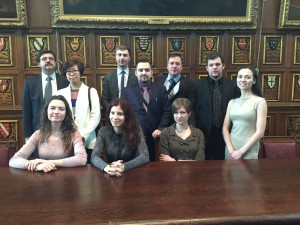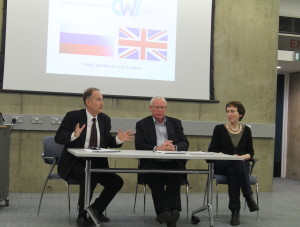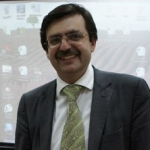30th March 2016
Justice and Welfare
Introduction by Keith Allan, HM Consul General St Petersburg
I was delighted to invite Arkady Gutnikov, Director of the St Petersburg Institute of Law, to share his impressions of a study visit to the UK by a group of Russian lawyers, organised by a newly established London-based charity, Citizens’ Watch International. In this blog, Arkady offers us his perspective of the system of criminal justice in England and Wales compared with Russia. Such exchanges provide an excellent platform for co-operation between legal professionals in our countries and a great opportunity to learn from each other. I hope you find Arkady’s blog interesting.
Blog by Arkady Gutnikov, Director of the St Petersburg Institute of Law
Justice and Welfare
Our first event in London was a visit to the Westminster Magistrate Court, where judges can be legal professionals or laymen without special qualifications. Ten young lawyers from Russia were fascinated by the atmosphere in the court room and the friendly and informal style in which judges interacted with all parties to the trial. “It is very important that defendants understand and accept the court ruling, even if they don’t agree with it; and it is equally important that society also understands and accepts decisions made by courts”, stressed the Chief Magistrate.
 In the famous Old Bailey – the Central Criminal Court of England and Wales – we were thrilled to see the inner quarters, including the reception room of the Lord Mayor of the City of London. The tour was conducted by one of the judges. We observed a jury trial in which he presided (it was a case of arms smuggling), studied the case papers and watched closely the actions of all those involved in the hearing. Prosecution were well prepared, and the quality of their evidence forced one of the defendants to consider the possibility of pleading guilty – the timing was crucial if he wanted to receive a more lenient sentence. The Common Sergeant of the Court, HHJ Richard Marks QC, explained to us how the judicial process worked in England and Wales. We were surprised that jury service has recently become obligatory for all, including legal professionals – Richard had himself served on the jury.
In the famous Old Bailey – the Central Criminal Court of England and Wales – we were thrilled to see the inner quarters, including the reception room of the Lord Mayor of the City of London. The tour was conducted by one of the judges. We observed a jury trial in which he presided (it was a case of arms smuggling), studied the case papers and watched closely the actions of all those involved in the hearing. Prosecution were well prepared, and the quality of their evidence forced one of the defendants to consider the possibility of pleading guilty – the timing was crucial if he wanted to receive a more lenient sentence. The Common Sergeant of the Court, HHJ Richard Marks QC, explained to us how the judicial process worked in England and Wales. We were surprised that jury service has recently become obligatory for all, including legal professionals – Richard had himself served on the jury.

Legal procedures in Russia and in England have much in common. However, attitudes and the style of communication are strikingly different. For example, the judge genuinely encourages the defence to seek examples of precedent that could help alleviate the sentence for their client, the defence team has confidence to forcefully argue for the revision of the sentence, and the judge listens to them with attention and respect.
Nonetheless, the criminal justice system in England is far from ideal. It is still emerging from the crisis of the 1970s-80s when serious violations were exposed in a series of scandals. Robert Brown, partner at ‘Corker and Binning’ talked about “falsifications of confessions, police violence and corruption” during this difficult period. Reform was necessary, and serious measures were introduced, including “full audio and video recording of interviews, obligatory presence of lawyers, closer supervision of detention facilities by a dedicated police officer, step-by-step guidance for police personnel – all of these resulted in significant improvements in the quality of police work.”
The last straw that led to change was the case of murder of Maxwell Confait in 1972 – we heard about it from Alastair Logan OBE, Vice-President of the Solicitors International Human Rights Group. During the investigation minors were forced to make false confessions implicating innocent people, a forensic expert made a mistaken conclusion on the time of death. It became clear that systemic change was needed, and under public pressure and through work of the Royal Commission on Criminal Procedure, the ‘Police and Criminal Evidence Act’ was passed in 1984. This and later legislation led to tangible improvements.
During a visit to a central London police station, custody Inspector Ashlie May and Detective Constable Shaun Duff showed us around, and we were able to see that respect for human rights was a priority for the police. This is the new generation of police officers that emerged as a result of reform.
At the launch of Citizens’ Watch International we were privileged to meet Sir Louis Bloom-Cooper QC who had been one of the barristers acting in the appeal in the Confait case. Sir Louis told young Russian lawyers they had professional and personal responsibility to uphold principles of the rule of law. District Judge Nick Crichton CBE spoke about his unique experience when through judicial process he took children out of dysfunctional families. He described the work of the Family Drug and Alcohol Court as “judicial therapy” and suggested that their practice of providing care for children and parents could be expanded, to help people change their behaviours and thus escape from the vicious circle where they face social challenges and criminal charges.

The entire criminal justice system is England is gradually changing from prosecution to rehabilitation, as demonstrated by the work of probation service. Two experienced probation officers, Keith Davies and Andy Bernhardt, explained that “traditionally, administration of law sought to achieve justice, whereas welfare of an individual remained the concern of social services. Nowadays, justice is perceived as a process that brings together administration of law and care for an individual’s well-being, and penalties are determined by this principle.
In the UK, as well as in Russia, the debate about the practice of the European Court of Human Rights in correlation to national legislation is ongoing. But in Britain in many aspects higher standards are applied in the criminal justice process than in continental Europe. Traditionally, the UK has played a leading role in law and justice.
However, we should not be misled by recognisable symbols of this tradition such as wigs, archaic titles of court officials or traditional meals held by law schools (we also enjoyed one in Middle Temple Inn). Legal norms, procedures, governance of the legal profession, professional ethics undergo change; new technologies are introduced into the judicial process. Still, professionalism and mutual trust remain at the core of this tradition. People trust their courts, legal professionals and police force. In return, they are treated with respect and enjoy trust.
These are the traditions that we would like to follow, and which we shall continue to discuss during our future events with Russian and British lawyers. Good-bye London! See you in St Petersburg!
